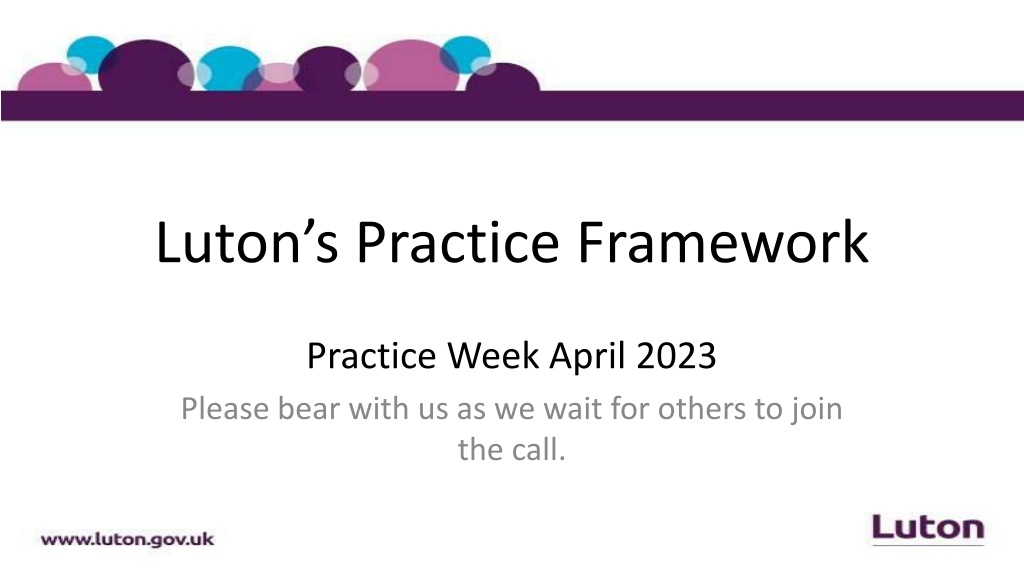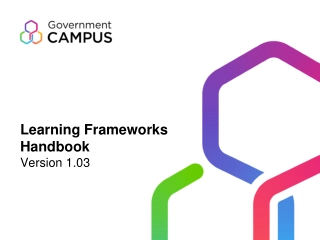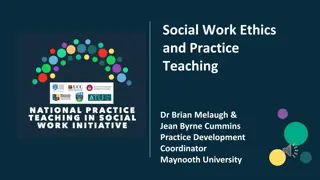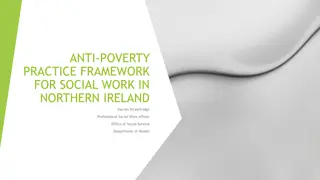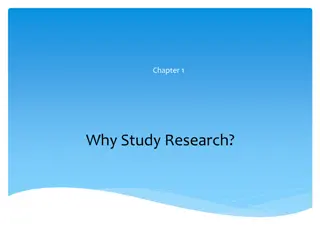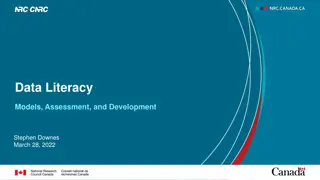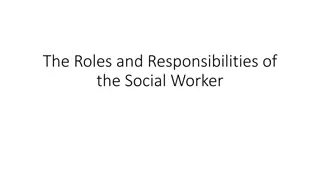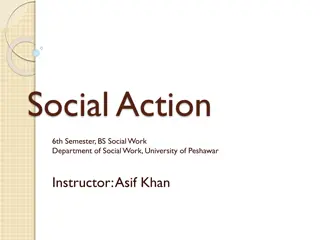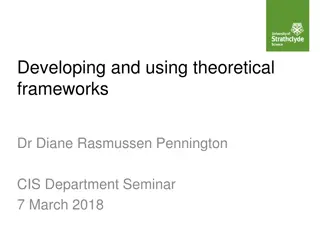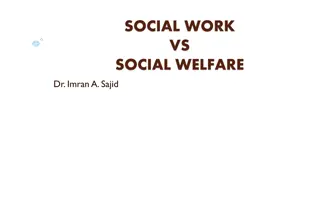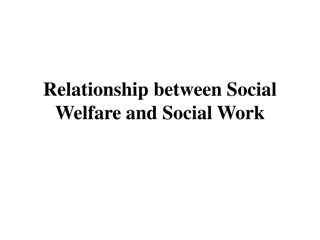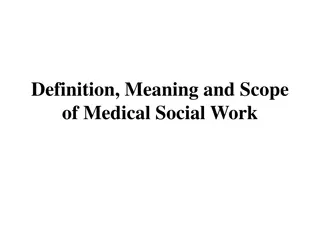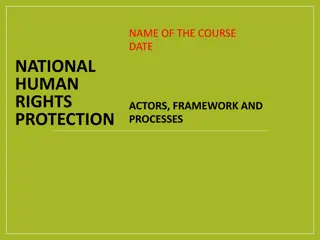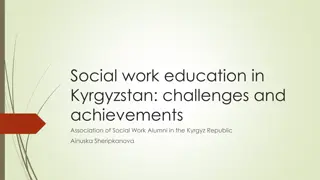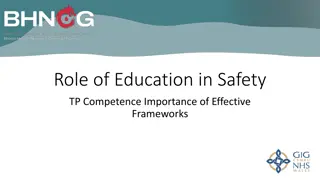Understanding the Importance of Practice Frameworks in Social Work
Social work practice relies on legal and theoretical frameworks to guide practitioners in providing effective support. These frameworks serve as tools for developing and evaluating impactful interventions. Legislation shapes interpretations in child protection cases, emphasizing diverse parenting standards and the limits of state intervention. Supreme Court rulings highlight the complexities of familial challenges and the need for a nuanced approach by local authorities, social workers, and family judges.
Download Presentation

Please find below an Image/Link to download the presentation.
The content on the website is provided AS IS for your information and personal use only. It may not be sold, licensed, or shared on other websites without obtaining consent from the author. Download presentation by click this link. If you encounter any issues during the download, it is possible that the publisher has removed the file from their server.
E N D
Presentation Transcript
Lutons Practice Framework Practice Week April 2023 Please bear with us as we wait for others to join the call.
Why the need for a Practice Framework? Social work is underpinned by legal frameworks Social work is underpinned by theoretical frameworks As practitioners we all bring a diverse range of experience with us, which a robust practice framework can be built Frameworks are a tool on which our practice can be developed and evaluated for impact
Social work practice is underpinned by the legislative framework. This requires interpretation and consideration :- Hedley J in Re L (Care: Threshold Criteria) [2007] 1 FLR 2050, para 50: "society must be willing to tolerate very diverse standards of parenting, including the eccentric, the barely adequate and the inconsistent. It follows too that children will inevitably have both very different experiences of parenting and very unequal consequences flowing from it. It means that some children will experience disadvantage and harm, while others flourish in atmospheres of loving security and emotional stability. These are the consequences of our fallible humanity and it is not the provenance of the state to spare children all the consequences of defective parenting. In any event, it simply could not be done."
Continued That approach was endorsed by the Supreme Court in In re B. There are two passages in the judgments of the Justices which develop the point The first is in the judgment of Lord Wilson of Culworth JSC where he said (para 28): 'many parents are hypochondriacs, many parents are criminals or benefit cheats, many parents discriminate against ethnic or sexual minorities, many parents support vile political parties or belong to unusual or militant religions. All of these follies are visited upon their children, who may well adopt or "model" them in their own lives but those children could not be removed for those reasons.' There is a powerful message in these judgments which needs always to be borne in mind by local authorities, by social workers, by children's guardians and by family judges.
Continued The other is the observation of Baroness Hale of Richmond JSC (para 143): "We are all frail human beings, with our fair share of unattractive character traits, which sometimes manifest themselves in bad behaviours which may be copied by our children. But the State does not and cannot take away the children of all the people who commit crimes, who abuse alcohol or drugs, who suffer from physical or mental illnesses or disabilities, or who espouse antisocial political or religious beliefs."
Continued His Honour Judge Jack said in North East Lincolnshire Council v G & L [2014] EWCC B77 (Fam), a judgment that attracted some attention.. "I deplore any form of domestic violence and I deplore parents who care for children when they are significantly under the influence of drink. But so far as Mr and Mrs C are concerned there is no evidence that I am aware of that any domestic violence between them or any drinking has had an adverse effect on any children who were in their care at the time when it took place. The reality is that in this country there must be tens of thousands of children who are cared for in homes where there is a degree of domestic violence (now very widely defined) and where parents on occasion drink more than they should, I am not condoning that for a moment, but the courts are not in the business of social engineering.
Continued The courts are not in the business of providing children with perfect homes. If we took into care and placed for adoption every child whose parents had had a domestic spat and every child whose parents on occasion had drunk too much then the care system would be overwhelmed and there would not be enough adoptive parents. So we have to have a degree of realism about prospective carers who come before the courts. (Hn Judge Jack, North East Lincolnshire Council v G & L [2014] EWCC B77 (Fam)
Luton Practice Framework Principles Working with, and championing our Practice Framework requires a thorough understanding of what drives us as a local authority? So what are some of our principles and how do we demonstrate them?
Principles Continued Child/ young person centred Family led Solution focused Evidence based Risk sensible Focused and purposeful We have corporate values, values as social care practitioners, individual team values, and our own personal values. Sometimes these may clash, but our BOTTOM LINES are always the same what we do is for the children and families we support, it s intended to find solutions, should always be evidence based, with risks evaluated, all whilst remaining focused and purposeful .
Principles Continued Luton Children Services has adopted a strength/relationship based approach as its practice framework. This is set out in the Practice Framework, with expectations for each part of the service, so that everyone is clear about what good practice looks like in Luton and everyone understands what is expected of them as they carry out their work with children and families. Our Practice Framework is like a navigation guide. If you arrive at a new destination without a guide, it can feel impossible to work out which way to turn . The Luton Practice Framework has been developed with practitioners and managers, aligning with the Practice Framework Reflective Tool to enable discussion and reflection on what good practice looks like in their particular team. Practitioners and their managers work within the framework of The Children Act 1989 and must adhere to any associated legislative and statutory guidance. It is a child s right to a family life . This means we will work with our children s family and friends to help them do their best for all our children.
Four Cs in a nutshell! Conversation Curiosity Courage Consideration
Luton Practice Framework Principles The Four Cs! The Four Cs! We will use conversations to build relationships with children and their families, we will actively listen to both their strengths and what they need help with. We will create the opportunity to have conversations with our professional networks to help us provide the right support at the right time. We will practice with respectful curiosity to help us understand the lived experience of children and young people who need our help. We will be curious about the families past experience. We will encourage curiosity across our professional network, helping us to build strong local relationships. We will practice with courage, not being afraid to fail and try new things supporting our children and families through change, modelling courageous conversations to challenge without blame. We will use courage to seek feedback on our practice and create a culture of safe challenge. Our practice will be considerate, respectful of diversity and difference, we will practice with care to ensure the best outcomes for our children and their families.
Our principles Engagement and assessment Are we building a relationship with the child within which we are clear about their views and experiences? Is all contact with the family respectful and do we understand the views of everyone in the family? Are we carefully crafting questions to enable us to be clear about the strengths and resources within the family? Are our judgements based on specific, observable behaviours and is the weight given to the worries and strengths supported by research? Do we have a clear and rigorous understanding of past harm, likely future danger, strengths and safety within the family? Are we clear about what we are trying to achieve each time we have contact with the family? Seeking solutions Securing safety and belonging Do we continue to obtain the child's views and understand their experiences as the case evolves? Becoming an adult Looking after myself Is the child clear why we're involved and have they been actively involved in identifying solutions? Is the young person fully informed and making their own choices about their future? Am I thinking about what I need from supervision? Child/ young person centered Is the family taking the lead in identifying the plan? Do the plans recognise and make use of all the people who are naturally connected to the child? Are we using solution focused questions to review safety, wellbeing and success and to reinforce positive change Are judgements about safety, wellbeing and success based on specific observable behaviours and on the child s voice? Are we supporting the young person to develop their independent network of support? Are we using solution focused questions to help the young person identify their aspirations and how they will reach these? Are the young person s aspirations grounded? Am I accessing work and professional networks to improve my practice? Family led Are we using solution focused questioning to help families reflect and build on existing safety? Am I clear about my own strengths, goals and what I need in order to achieve my goals? Solution focused Are the safety plans rigorously tested out in relation to trigger points/signs of relapse etc? Am I continuing to learn from research, from my own successes and mistakes and from others? Evidence based Does the safety plan ensure safety for the child in those moments when parents make mistakes/ relapse/get things wrong? Is there a clear, understood trajectory setting out what will happen at every stage until case closure? Are we managing the tension between giving the family every opportunity vs the child s timeframe? Are we managing the balance between independence and support? Am I taking steps to maintain a healthy work/life balance? Risk sensible Are we continuing to ensure that all our activity is helping to drive things towards the child s safety, wellbeing or success goal? Do we have a clear, agreed timeline for each young person s transition into independence and adulthood? Am I clear about my personal work objectives and priorities? Focused and purposeful
